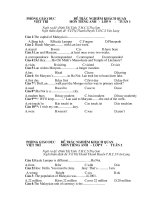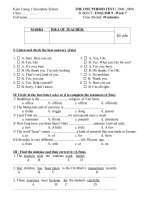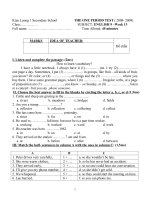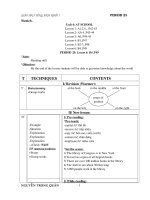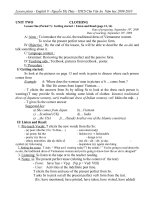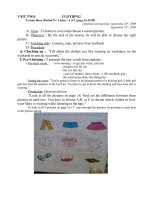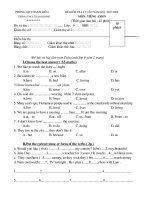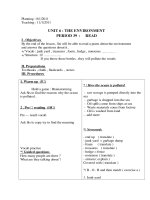ANH 9 TUẦN 4
Bạn đang xem bản rút gọn của tài liệu. Xem và tải ngay bản đầy đủ của tài liệu tại đây (95.41 KB, 5 trang )
<span class='text_page_counter'>(1)</span><div class='page_container' data-page=1>
<b>Unit 2</b>
:<b>CLOTHING</b>
<b>I.Objectives</b>
-To ask & respond to questions on personal preferences
-To ask for and give information
-To write an exposition
-To practice in present perfect & further practice in the passive
<b>II.Teaching aids:</b>
- Books, posters, tape & cassette, pictures….
<b>III. Procedure</b>
P7 U2L1: Getting started- Listen and read
P8 U2L2: Speak
P9 U2L3: Listen
P10 U2L4: Read
P11 U2L5: Write
P12 U2L6: Language focus
Date of preparing:
<b>Unit 2</b>
<b> Period 7 Lesson 1: GETTING STARTED- LISTEN AND READ</b>
<b>I.Objectives</b>
1. Knowledge: Reading the text for details about “ Ao dai”- the traditional dress
of Vietnamese women.
2. Skill: Practice reading skill about “ Ao dai”.
3. Attitude: help ss love our traditional dress of Vietnamese women.
<b>II.Teaching aids: book, computer, projector, ipads</b>
<b>III.Method: PWP</b>
<b>IV. Contents</b>
<i><b> 1. Organization</b></i>
Class Date of teaching Absent ss
<i><b> 2. Warmer ( 5’ )</b></i>
+Matching/ Getting started
? Open you books, look at the pictures & name the dresses that people are wearing?
-T hang a poster with 2 columns & phrases then run through
-divide class into 2 teams, model & ask ss to match the clothes they wear with the
countries they come from
-T get feedback from ss
A B
a. a kimono
b. Ao dai
c. a kilt
d. a sari
e. jeans
f. a veil
1. He comes from the USA
2. He comes from Scotland ( UK )
3. She comes from India
4. She comes from Vietnam
5. She comes from Arabia ( Saudi )
6. She comes from Japan
n.b:- a kilt ( n ) váy của người miền núi Keys: a-6, b-4, c-2, d-3, e-1,
f-5
</div>
<span class='text_page_counter'>(2)</span><div class='page_container' data-page=2>
- a veil ( n ) mạng che mặt
<i><b> 3.New lesson</b></i>
<b>* Pre-reading ( 10’ )</b>
+Pre-teach
Eg: Nguyen Du, To Huu are….
Translation
Translation
Translation
Eg: Ede,H’mong, Thai are…
Picture
-T follow steps of teaching vocab
+Rub out & remember
-T follow steps of ROR
+Pre-questions
-T: You are reading a text about Ao
dai-the traditional dress of Vietnam
-T gives 2 qts, ask ss to answer without
reading the text
<b>* While-reading ( 18’ )</b>
+Correction
-Ss listen to the tape & read the text to
answer the pre-qts
-T get feedback from ss
+Gap-fill
? Look at exer a P.14
-T run through, and model. Ss read the
text again to get information to
complete the sentences individually
compare with partners
-T get feedback from ss
+Comprehension questions
? Look at exer b P.14
-T run through the 3 qts. Ss read the text
again and answer the qts in pairs
pairs compare
-T get feedback from ss ( ask some
pairs to ask & answer before class )
<b>* Post-reading ( 10’ )</b>
+Discussion
-T divide class into groups of 8- each
group has a secretary
-T give a topic, ask ss to discuss in
groups
-Representative from a group speak
<b>I.Vocabulary</b>
-poet ( n ) nhà thơ
-long silk tunic ( n ) áo lụa dài, rộng
- slit ( v ) xẻ ( n: đường xẻ )
- inspiration ( n ) cảm hứng, hứng khởi
-ethnic minority ( n ) dân tộc thiểu số
-pattern ( n ) hoa văn
<b>II.The text</b>
1.What material is Ao dai made from?
( silk )
2.Who wears Ao dai? Is modern Ao dai
different from the old one?
( Women, it is different….)
+Exercise a P.14
1….poems, novels, and songs.
2…..long silk tunic with slits up the side
worn over loose pants
3….to wear modern clothing at work
4…..lines of poetry on it
5…..symbols such as suns, stars, crosses,
and stripes
+Exercise b P.14
1. Traditionally, men and women
used to wear the “ Ao dai”
2. Because it is more convenient
3. They have printed lines of poetry
on it or have added symbols such
as suns, stars, crosses, and stripes
to the “ Ao dai”
</div>
<span class='text_page_counter'>(3)</span><div class='page_container' data-page=3>
before class, other groups add more
-T add if necessary
<i><b>4. Summary ( 1’ ) ?What do we learn today? Do you like Vietnamese Ao dai?</b></i>
Why/Why not?
<i><b>5. Homework ( 1’ )Write a short paragraph telling what you have known about the </b></i>
“ Ao dai”.
<b>*Evaluation</b>
...
...
Date of preparing:
<b>Unit 2</b>
<b> Period 8 Lesson 2: SPEAK</b>
<b>I.Objectives</b>
1. Knowledge: By the end of the lesson, ss will be able to practice in asking &
answering about the dress/ clothes.
2. Skill: practice speaking skill in asking and answering about the dress/ clothes.
3. Attitude: help ss love our traditional dress of Vietnamese women.
<b>II.Teaching aids: book, picture, poster</b>
<b>III.Method: PWP</b>
<b>IV.Contents</b>
<i><b> 1. Organization</b></i>
Class Date of teaching Absent ss
<i><b> 2. Warmer ( 5’ )</b></i>
+Network
-T model, ss tell names of clothes they know T. shirt
-Ss write on bb in 2 groups
-T get feedback & add more if necessary
<i><b> 3.New lesson</b></i>
<b>* Pre-speaking ( 10’ )</b>
+Preteach
Picture
Picture
Realia
Realia/ picture
Realia
-T follow steps of teaching
<b>I.Vocabulary</b>
-plaid ( adj ) kẻ ca rô, kẻ ô vuông
-plain ( adj ) trơn ( không có hoa hay h vẽ )
-faded ( adj ) bạc màu, phai màu
-baggy ( adj ) rộng thùng thình, thụng
Eg: baggy pants: quần ống thụng
-short-sleeved/ sleeveless ( adj ) ngắn tay/
Khơng có tay( sát nách )
clothes
</div>
<span class='text_page_counter'>(4)</span><div class='page_container' data-page=4>
vocab
+Slap the board
T follow steps of slapping the
board
+Matching
? Look at exer a P.14
-T run through & model, ss
match the phrases to the
pictures in pairs compare
with the partners
-T get feedback from ss
<b>* While-speaking ( 18’ )</b>
+Survey
-T give handouts & model
with a ss, ask ss to work in
pairs asking & answering then
tick ( v ). Ss work in open then
close pairs.
<b>Eg:</b>
S1:What do you usually wear
on weekday?
S2: I often wear school
uniform
S1: Why do you wear these
clothes?
S2: Because…..
……….
S1:Which clothes do you like
wearing on Tet holiday/ at a
party….?
S2:…..
-T. go round to help & monitor
<b>* Post-speaking ( 10’ )</b>
+Retelling
-Ss retell their survey before
class using indirected speech
-T get feedback from ss &
correct
if necessary
<b>II.Speaking</b>
+Exercise a P.14
a-1, b-5, c-6, d-3, e-8, f-4, g-7, h-2, i-9
+Exercise b P.15
Occasion
Clothes
Week-day weekend Special
occasion
1.casual
clothes
2.favorite
clothes
3.school
uniform
v.
compulsory
v.
comfortable
v. more
confident
Eg: Lan said that she liked wearing favorite
clothes on special occasion because she felt more
confident…..
<i><b> 4. Summary ( 1’ )</b></i>
?What do we learn today? ( Names of some clothes……)
<i><b> 5. Homework ( 1’ )</b></i>
Write a short paragraph about types of clothes you like
Ngắn
tay kẻ ca
rô
</div>
<span class='text_page_counter'>(5)</span><div class='page_container' data-page=5>
<b>*Evaluation</b>
………
………
TCM duyệt ngày .../ .../
</div>
<!--links-->
